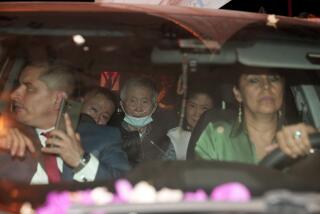Peru Hopes Aid Will Follow Promises of Democracy
WASHINGTON — Peruvian officials hope their promises to restore democracy by the end of the year will help that impoverished nation line up more than $500 million in economic aid during meetings next week with officials of the U.S. government and international banks, Peru’s economy minister said Friday.
In an interview, the minister, Carlos Bolona, acknowledged that Peru’s only hope for long-term economic recovery lies in restoring the democratic institutions that Peruvian President Alberto Fujimori closed down in April in what has been described as a “self-coup.” He said a constituent assembly will be elected Nov. 22 to oversee Fujimori’s administration and draft a new constitution.
The United States and the Inter-American Development Bank suspended aid programs after Fujimori seized full powers with the backing of the armed forces on April 5, although the International Monetary Fund and Japan continued their programs in Peru. Fujimori disbanded Congress and began to rule by decree. He dismissed most judges and replaced them with jurists of his own choosing.
Bolona described the ousted Congress and judiciary as corrupt and inefficient. “It is hard to understand how to close Congress and get more democratic,” he said. “But after Nov. 22, we will be more democratic.”
He said he is seeking about $200 million in economic aid from the United States, about $100 million from Japan and about $220 million from the Inter-American bank.
A State Department official said that Washington will consider restoring aid programs and resume normal relations with Peru if the November election is free and fair and if Fujimori’s government takes effective action against the cocaine trade.
Peru is the world’s leading producer of coca leaf, the raw material for the drug.
Bolona said Fujimori’s consolidation of power damaged the economy by interrupting the flow of foreign aid. But he said it enabled the president to impose some tough anti-terrorism laws that Congress had repeatedly rejected. He said the new statutes may have helped the government arrest Abimael Guzman, leader of the bloody terrorist group, Sendero Luminoso.
Nevertheless, he said it would be a mistake for any other country to follow Peru’s example because no other country faces problems as severe.
“For a country to take the example of Peru, it would have to have inflation of 7,000% a year, face a murderous terrorist group like Sendero and have such a serious narcotics problem that half of its exports are in cocaine,” Bolona said. “Peru is an exception.”
Asked if he could assure foreign lenders that Fujimori would not close down the assembly that is elected in November the way he did the old Congress, Bolona said he could provide no iron-clad guarantee.
“There is always that risk,” he said. “But if we want to be members of the international financial community, he couldn’t do that. It is in the best interest of President Fujimori to keep this Congress sovereign and in place.”
More to Read
Sign up for Essential California
The most important California stories and recommendations in your inbox every morning.
You may occasionally receive promotional content from the Los Angeles Times.










